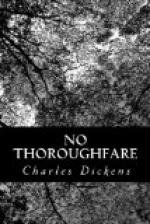THE OVERTURE.
Day of the month and year, November the thirtieth, one thousand eight hundred and thirty-five. London Time by the great clock of Saint Paul’s, ten at night. All the lesser London churches strain their metallic throats. Some, flippantly begin before the heavy bell of the great cathedral; some, tardily begin three, four, half a dozen, strokes behind it; all are in sufficiently near accord, to leave a resonance in the air, as if the winged father who devours his children, had made a sounding sweep with his gigantic scythe in flying over the city.
What is this clock lower than most of the rest, and nearer to the ear, that lags so far behind to-night as to strike into the vibration alone? This is the clock of the Hospital for Foundling Children. Time was, when the Foundlings were received without question in a cradle at the gate. Time is, when inquiries are made respecting them, and they are taken as by favour from the mothers who relinquish all natural knowledge of them and claim to them for evermore.
The moon is at the full, and the night is fair with light clouds. The day has been otherwise than fair, for slush and mud, thickened with the droppings of heavy fog, lie black in the streets. The veiled lady who flutters up and down near the postern-gate of the Hospital for Foundling Children has need to be well shod to-night.
She flutters to and fro, avoiding the stand of hackney-coaches, and often pausing in the shadow of the western end of the great quadrangle wall, with her face turned towards the gate. As above her there is the purity of the moonlit sky, and below her there are the defilements of the pavement, so may she, haply, be divided in her mind between two vistas of reflection or experience. As her footprints crossing and recrossing one another have made a labyrinth in the mire, so may her track in life have involved itself in an intricate and unravellable tangle.
The postern-gate of the Hospital for Foundling Children opens, and a young woman comes out. The lady stands aside, observes closely, sees that the gate is quietly closed again from within, and follows the young woman.
Two or three streets have been traversed in silence before she, following close behind the object of her attention, stretches out her hand and touches her. Then the young woman stops and looks round, startled.
“You touched me last night, and, when I turned my head, you would not speak. Why do you follow me like a silent ghost?”
“It was not,” returned the lady, in a low voice, “that I would not speak, but that I could not when I tried.”
“What do you want of me? I have never done you any harm?”
“Never.”
“Do I know you?”
“No.”
“Then what can you want of me?”
“Here are two guineas in this paper. Take my poor little present, and I will tell you.”




